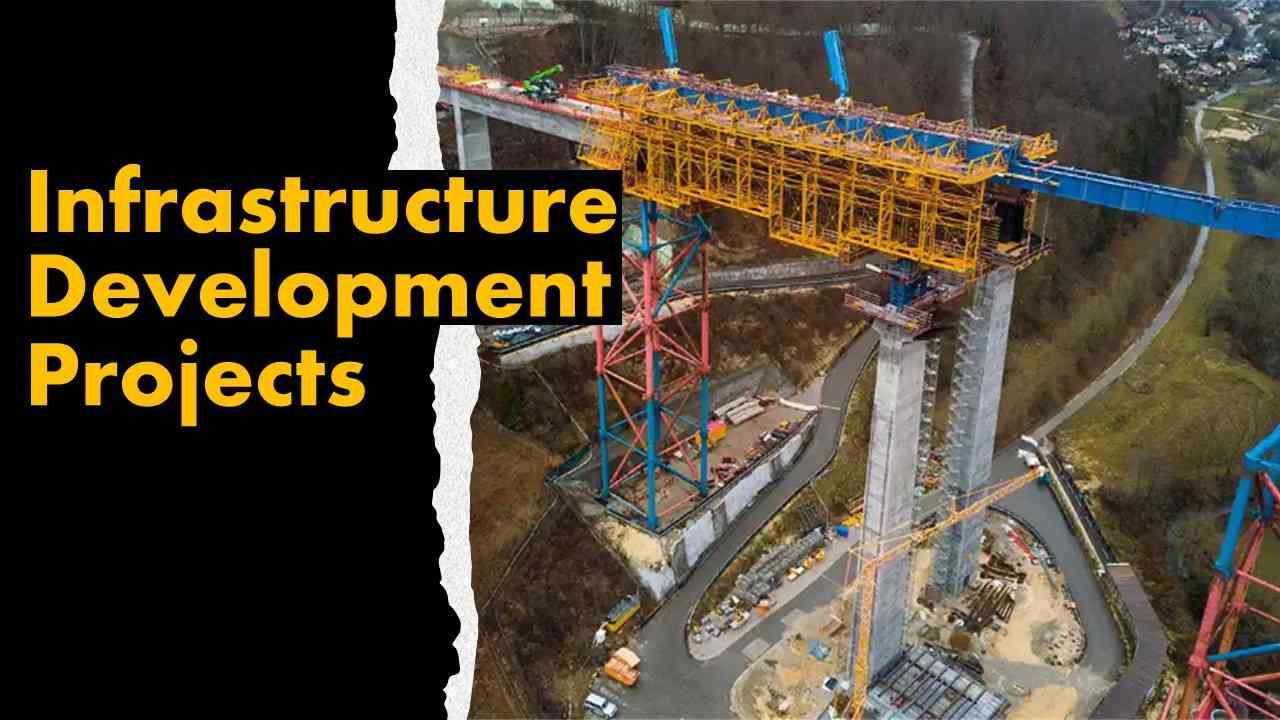Infrastructure Development Projects Driving Global Construction Growth
- By
- Pooja |
- January 20, 2024 |
- Civil Engineering, Construction,

Table of Contents
The Infrastructure Boom: A Global Phenomenon
Key Drivers of Infrastructure Development
Impact on the Global Construction Industry
Demand for Sustainable Solutions:
Noteworthy Infrastructure Projects
Challenges and Future Prospects
Urbanization and Infrastructure Needs:
Technological Advancements in Infrastructure:
Government Initiatives and Policies:
Environmental Considerations in Infrastructure Projects:
Impacts on Construction Industry and Employment:
Noteworthy Infrastructure Projects Worldwide:
Challenges and Future Outlook:
Global Collaboration and Partnerships:
Economic and Social Impacts of Infrastructure Development:
Infrastructure development projects play a pivotal role in shaping the economic, social, and environmental landscape of nations worldwide. From roads and bridges to airports, energy networks, and communication systems, these projects not only enhance connectivity but also stimulate economic growth and improve living standards.
In recent times, there has been a surge in infrastructure investments across various regions, propelling the global construction industry into a phase of unprecedented growth and innovation.
The Infrastructure Boom: A Global Phenomenon
Around the world, governments and private entities have recognized the need to invest substantially in infrastructure to meet the demands of growing populations and urbanization. Developing countries are focusing on building new infrastructure, while developed nations are prioritizing renovation and modernization projects. The combined effort has resulted in a surge of construction activities, driving the global infrastructure market.
Key Drivers of Infrastructure Development
Urbanization:
As populations continue to concentrate in urban areas, the demand for better transportation, housing, water, and sanitation facilities has skyrocketed. Infrastructure projects are crucial to accommodate this influx of people and support sustainable urban development.
Technological Advancements:
Innovations like smart infrastructure, renewable energy systems, and digital connectivity are reshaping the infrastructure landscape. Governments and private investors are leveraging technology to create more efficient and sustainable infrastructure solutions.
Read More:
Government Initiatives:
Many governments have launched ambitious infrastructure programs to stimulate economic growth, create jobs, and improve overall quality of life. Initiatives like China's Belt and Road Initiative (BRI) and the European Union's Green Deal reflect this trend.
Environmental Concerns:
There's a growing emphasis on environmentally friendly infrastructure projects that reduce carbon footprints and promote sustainability. Investments in renewable energy, eco-friendly construction materials, and green transportation are gaining traction.
Impact on the Global Construction Industry
The boom in infrastructure development has significantly influenced the construction sector, leading to several notable impacts:
Increased Employment:
Infrastructure projects create jobs across various skill levels, providing employment opportunities and boosting local economies.
Technological Integration:
The construction industry is embracing digitalization and advanced technologies such as Building Information Modeling (BIM), drones, and automation to enhance project efficiency and accuracy.
Demand for Sustainable Solutions:
There's a growing demand for environmentally sustainable construction practices, encouraging innovation in eco-friendly materials and green building techniques.
International Collaboration:
Large-scale infrastructure projects often involve international collaboration, fostering partnerships between countries and companies.
Noteworthy Infrastructure Projects
Several high-profile infrastructure projects are shaping the global construction landscape:
High-Speed Rail Networks:
Projects like the California High-Speed Rail, China's extensive rail network expansion, and the High-Speed 2 (HS2) in the United Kingdom are revolutionizing transportation.
Renewable Energy Initiatives:
Solar and wind energy projects, such as the Solar Parks in India and offshore wind farms in Europe, are contributing to a greener future.
Smart Cities:
Initiatives like Songdo in South Korea and Masdar City in the UAE are showcasing smart infrastructure technologies for sustainable urban living.
Water Management Systems:
Large-scale projects like the Fika Patso Dam in Lesotho and the Thames Tideway Tunnel in the UK highlight the importance of water infrastructure for communities.
Read More:
Challenges and Future Prospects
Despite the positive momentum, the infrastructure sector faces challenges such as funding constraints, regulatory hurdles, geopolitical tensions, and environmental impact concerns. However, technological advancements, innovative financing models, and increased collaboration among stakeholders offer avenues for overcoming these challenges.
The future of the global construction industry appears promising, driven by the ongoing demand for infrastructure development. As nations strive to bridge infrastructure gaps and embrace sustainable practices, the sector will continue to evolve, fostering economic growth and improving the quality of life for billions worldwide.
Urbanization and Infrastructure Needs:
Exploring how rapid urbanization has led to increased demands for infrastructure in cities, emphasizing the necessity for transportation, housing, water, and sanitation facilities.
Analyzing the challenges posed by urbanization, such as traffic congestion, housing shortages, and the strain on existing infrastructure.
Technological Advancements in Infrastructure:
Discussing the role of cutting-edge technologies like Internet of Things (IoT), artificial intelligence (AI), and data analytics in revolutionizing infrastructure development.
Detailing specific instances where technology has enhanced project efficiency, safety measures, and sustainability in construction.
Government Initiatives and Policies:
Highlighting major government-led infrastructure programs worldwide, such as the BRI in China, the Green Deal in the European Union, or national initiatives in other countries.
Discussing the economic and social impacts of these initiatives, including job creation, economic growth, and improved standards of living.
Environmental Considerations in Infrastructure Projects:
Examining the growing emphasis on eco-friendly infrastructure and sustainable construction practices, including the use of renewable energy sources, green materials, and carbon-neutral designs.
Discussing the challenges and opportunities in balancing economic development with environmental conservation in infrastructure projects.
Impacts on Construction Industry and Employment:
Detailing the direct and indirect effects of infrastructure development on the construction sector, including increased demand for skilled labor, technological integration, and the evolution of construction techniques.
Highlighting how infrastructure projects stimulate economic activity in related sectors, creating jobs and boosting local economies.
Noteworthy Infrastructure Projects Worldwide:
Providing an in-depth analysis of specific landmark infrastructure projects across various sectors such as transportation, energy, communication, and water management.
Highlighting the impact of these projects on regional development, economic growth, and the quality of life for local populations.
Challenges and Future Outlook:
Delving into the challenges faced by the infrastructure sector, such as funding constraints, regulatory complexities, geopolitical issues, and environmental concerns.
Presenting potential solutions, including innovative financing models, technology-driven solutions, and international collaborations to address these challenges.
Global Collaboration and Partnerships:
Discussing the importance of international collaborations in large-scale infrastructure projects and how partnerships between countries and companies drive innovation and project success.
Highlighting successful examples of global cooperation in infrastructure development.
Economic and Social Impacts of Infrastructure Development:
Analyzing the broader economic impacts of infrastructure development on GDP growth, trade, and regional competitiveness.
Discussing how improved infrastructure positively affects social aspects such as healthcare, education, and overall quality of life.
Expanding on these aspects would provide a comprehensive understanding of the role and impact of infrastructure development projects in driving global construction growth and their significance in shaping the future of societies and economies worldwide.
In conclusion, infrastructure development projects are the backbone of global progress, influencing economic growth, societal advancement, and environmental sustainability. The ongoing surge in infrastructure investments signifies a promising future for the construction industry, shaping a world that is more connected, sustainable, and resilient.
Please feel free to like, share and comment.
Admin, gcelab.com
Please see our Pillar Post to know why we founded gcelab.com.
Read More:

Pooja
Founder at gcelab.com, Pooja is an Entrepreneur unlocking human potential. Working in the Principles of Lean Start-up, Pooja believes in Transparency and User Happiness the most. Pooja’s background in teaching gives her a sophisticated grasp on even the most tedious aspect of course building. She is passionate about people who believe that good is not enough.



